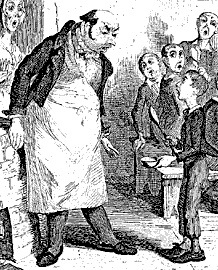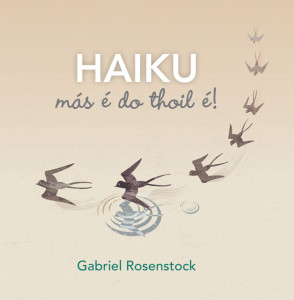Say ‘Pleeeeease’! (i nGaeilge) Posted by róislín on May 6, 2014 in Irish Language
(le Róislín)

‘Le do thoil, a dhuine uasail, …’ (a dúirt Oilibhéar). Aistriúchán den chuid eile den athfhriotal le teacht i mblag eile — tá a lán dóigheanna ann le “I want some more” a rá!
I recently came across an interesting web page discussing the English word “please” (nasc thíos). It pointed out that “please” in English can be a verb, an adverb, and an interjection. Or to insinuate a few Irish grammar terms into this blog: briathar, dobhriathar, agus intriacht. It set me thinking (ní nach ionadh), how does this compare to Irish?
In a nutshell, here’s my conclusion. Each point will be discussed in a little more depth further below:
a) As a verb, “to please,” the main candidate is “taitneamh,” but there are a number of other verbs that can convey the same or a similar meaning.
b) For the “adverbial” meaning in English, with requests (like “two coffees, please”), the most typical equivalents in Irish are “le do thoil” and “más é do thoil é.” However, neither of these phrases is grammatically an adverb, as we’ll see below. In fact, even considering “please” as an “adverb” in English is a stretch, but it seems to be widely accepted. It’s not the usual type of adverb, which describes the action of the verb, such as “He walked quietly.” Sometimes, as here, it seems the term “adverb” is used as a “catchall” category for miscellaneous types of words.
Although “le do thoil” and “más é do thoil é” are the main candidates for “please (may I have, etc.),” there are other ways to express politeness as well, without necessarily using the word/phrase “please” as such.
c) For “Please!” as an interjection, indicating disbelief or protest, we really have to leave the usual realm of “please.” None of the typical Irish expressions for this purpose are connected to saying “please” for politeness. Here, we’re talking about the English staccato “puh-leeze” pronunciation. Presumably it’s short for something like “Please don’t expect me to believe (or accept) that.” In Irish, one typical response to an unbelievable or absurd statement is “ag magadh atá tú.” Literally, that’s “you’re joking.” Or more literally, “it’s joking that you are.”
So let’s look a little more closely at how we can use these terms:
1) “please” mar bhriathar (as a verb): taitin (or taitnigh, etc.). The most ba3sic meaning of this verb is “shine” and it can be used to say “the sun is shining” (Tá an ghrian ag taitneamh.). For sentences like “It pleased me” (i.e. I liked it), we need to add “le” (with). Whoever is doing the “liking” (or is “pleased”) ends up in the sentence after the word “le” (i.e. as the object of the preposition). For some typical examples, we’ll go to the past tense, since this construction is very widely used in that context:
Ar thaitin Avatar leat? Did Avatar please you?, i.e. Did you like Avatar? (“leat” = with you). Very literally, this is “Did Avatar shine with you?”
Feicim go bhfuil Cogadh agus Síocháin léite agat. Ar thaitin sé leat? I see you have read War and Peace. Did it please you? i.e. Did you like it?
Here’s an example in the present tense:
An dtaitníonn hákarl leat? Does hákarl please you? i.e. Do you like hákarl?
Cad is “hákarl” ann?
De réir askmen.com (nasc thíos), is feoil leasaithe an liamháin é. “Leasaithe” may sound reasonably palatable but further investigation reveals that the basking-shark meat is “cured” by being buried in a pit of gravel and snow or sand for 6 to 12 weeks, and then dried. Apparently first-timers are advised to hold their nose when they try eating hákarl. A shot of “brennivín” (cineál sneapa) is supposed to help it go down. Níor bhlais mise riamh é. Tusa?
Cá n-itear hákarl? (Where is hákarl eaten?). Barúil ar bith agat?
Itear san Íoslainn é.
To actually answer the question, “Do you like hákarl?,” the choices are:
Taitníonn (yes)
Or for a more complete answer, “Taitníonn, taitníonn sé liom. Tá sé an-bhlasta.”
For “no”:
Ní tháitníonn (no)
Longer answer: Ní thaitníonn, ní thaitníonn sé liom ar chor ar bith.
Or simply:
An ag magadh atá tú? (Is it joking that you are?)
2) “please” mar dhobhriathar (as an adverb) : How about our next function of “please,” to make a polite request (as in “Ba mhaith liom giota beag hákarl, le do thoil!”)
There are two phrases that are very close equivalents to the English “please” (with requests). First:
le do thoil [leh duh hul], please, i.e. if you please, lit. with your wish (not literally “if”)
To address several people, this phrase must be made plural:
le bhur dtoil [leh wur dul]
The second phrase is:
más é do thoil é, if you please, lit. if it is your wish (this phrase incorporates the word “má,” which means “if”)
Pronunciation note: Normally “más” would be pronounced “mawss” (with a “broad s”) but here the second word, “é,” changes it to “mawsh,” with a “slender s.” Also “hul” and “dul” for “thoil” and “dtoil” are simply approximations. I’ve also seen these sounds transcribed as “hil,” “hwil,” and “dil.” There’s a slight “-il” sound at the end, almost like “huh-il” or “duh-il” but it’s not really a two-syllable word. Maybe the best approach is simply to say it rhymes with “scoil.” And, of course, the unlenited, uneclipsed form of the word is “toil” (tul, or, if you will, “tuh-il”), whose meanings include “will,” “desire,” and “wish.”
This can also be pluralized:
más é bhur dtoil é
Here are some possible phrases with “le do thoil” or “más é do thoil é“:
Seas anseo, le do thoil.
Abair arís é, más é do thoil é.
If ordering food or drink:
Dhá shú, le do thoil.
An t-anraith mineastróine, más é do thoil é.
And then there’s the book, Haiku más é do thoil é, by Gabriel Rosenstock (nasc thíos)
Sometimes “please” is implied but not stated, as in these phrases:
Ar mhiste leat an scéal a insint dom? please tell me the story, lit. would you mind telling me the story?
Ar mhiste libh suí síos? please be seated, lit. would you mind sitting down?
3) “please” mar intriacht (as an interjection): And finally, we have “please” as the interjection indicating disbelief or protest. (“Oh, puh-leeze! Do you think I was born yesterday?”). As mentioned above, we pretty much have to look beyond “please” for the Irish equivalent.
ag magadh atá tú, you’re joking, lit. (it’s) joking that you are
Sometimes, to be a little more dramatic, people say,
Níor tháinig mé isteach leis an lán mara, I didn’t come in with the full tide.
Ní inniu ná inné a rugadh mise!, I wasn’t born yesterday, lit. It wasn’t today or yesterday that I was born. Curious that the Irish expression mentions “today” as well as “yesterday” while the English one settles for just “yesterday.”
As with many other words and phrases, there are many more dimensions to all of these words and phrases, but this blog provides the basics of how to say “please” in Irish. So, to summarize:
a) Taitníonn sé liom. I like it, lit. It pleases (with) me.
b) le do thoil OR más é do thoil é, please (with requests, etc.)
c) Ag magadh atá tú! Please! (to indicate disbelief or protest)
Tá súil agam gur thaitin an blag seo leat. SGF — Róislín
Naisc:
http://english.stackexchange.com/questions/46390/part-of-speech-for-please-followed-by-a-verb
http://www.askmen.com/top_10/entertainment/top-10-worst-foods-in-the-world_1.html
http://leabhar.ie/product/haiku-mas-e-do-thoil-e-2/?lang=en

Build vocabulary, practice pronunciation, and more with Transparent Language Online. Available anytime, anywhere, on any device.





Comments:
Jack:
This is surprisingly good! Here in Ireland, I wouldn’t be familiar with some of the phrases or word usage that I read here, but they’re probably more grammatically correct. We’d say it mostly different ways, but these are all good too.
An-mhaith ar fad!
róislín:
@Jack A Jack, a chara,
Tá áthas orm gur thaitin an blag leat. Go raibh maith agat as scríobh isteach!